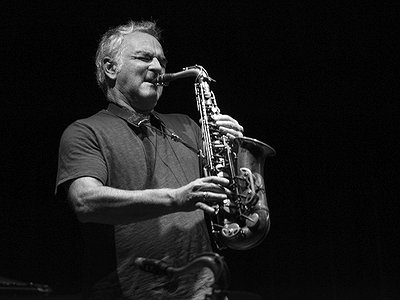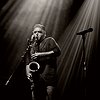What was your own learning curve / creative development like when it comes to improvisation - what were challenges and breakthroughs?
The most important part of learning to improvise is having enough tools in your toolbox to be capable of actively creating spontaneous musical choices —- tonal, harmonic, rhythmic, timbral, and dynamic choices.
To be a serious improvisor, you must dedicate yourself to learning music on so many different levels that you can insure that you have the ability to get out of the way and let the music flow out of you based on your artistic choices, without you or your instrument interfering in the process.
For me, this includes not only mastery of all my instruments, but the integration of all aspects of my life into a whole — the traveling, the literature, film, meditation, poetry, art, dance, language, love … all of it combines to form my own personal creative well of artistic and spiritual experience to draw on when I pick up my horn and play.
Tell me about your instrument and/or tools, please. How would you describe the relationship with it? What are its most important qualities and how do they influence the musical results and your own performance?
I am a multi-instrumentalist woodwind player, so the most important thing to me is always having a great sound.
I have spent years developing my tone and my own voice on each of my instruments. It is very personal and specific to how I hear each of them, and I want to make sure that I am choosing the instrumental voice that best expresses the piece of music that I am playing at any given moment.
Here is an example of me playing several different instruments on one piece:
How do you feel your sense of identity influences your collaborations? Do you feel as though you are able to express yourself more fully in solo mode or, conversely, through the interaction with other musicians? Are you “gaining” or “sacrificing” something in a collaboration?
My role varies depending on the situation. When I am leading a band, I consider my role to be a bit of a benevolent dictator —- directing the band with my sound and using my instrument to control or let go as the situation calls for. In terms of melody or soloing, I consider my role to be primarily cantorial, preaching to the audience from the depths of my being.
If I am part of a large group led by someone else, as I am in two of my long-term associations — with (the late great) Greg Tate’s Burnt Sugar Arkestra and Adam Rudolph’s Go:Organic Orchestra — my role is primarily supportive. I love this role and take it very seriously. I need to listen carefully to make sure and blend with the others, while maintaining my own spirit and subtly guiding the music in directions that I feel and believe in. If and when I get a chance to solo, then I often employ my cantorial, preacher’s voice once again …
I love playing solo and, unlike many professional musicians, I’ve spent a huge amount of my life practicing and playing outdoors in a variety of cities and environments — from the streets of Paris, Amsterdam, and Barcelona, to the coasts of Morocco and Spain, and the piers of the Hudson River. This practice has resulted in a deep awareness of my connections to everyday people and nature, not just to specific audiences who have come out to hear me.
I pride myself on my ability to connect with everyone, including kids and animals!!
For several years now I have been performing solo with the large-scale sculptures of Richard Serra as part of my series, The Resonant Sculpture Project, in which I interact acoustically with his sculptures in front of a live audience and film crew. This is one of the most demanding performance experiences that I have ever created for myself.
A short compilation of my solo work from The Resonant Sculpture Project:
Performing solo is an act of extreme courage, intimacy and vulnerability. It is something I have focused on my entire life and feel extremely comfortable with, but it's definitely not for everyone.
That said, if you feel that you are “sacrificing” something when you collaborate with others, then I think you definitely need to find new people to play with!!
There are many descriptions of the ideal state of mind for being creative. What is it like for you? In which way is it different between your solo work and collaborations?
Personally, I respond well to pressure, so I like deadlines for composing and creating. Also, the bigger the gig, the more I like it. If I’m not at least a little terrified backstage, I don’t really feel alive.
Of course, the personnel and relationships between the musicians has a great effect on the music itself. And, as everyone knows —- The key to a truly great performance is a truly horrible rehearsal the day before!!
How would you describe your views on topics like originality and innovation versus perfection and timelessness in music? Are you interested in a “music of the future” or “continuing a tradition”?
I am interested in authenticity. I want to express and reveal as much of my true self as possible.
I do not concern myself with innovation, only expression. Since I love many aspects of the Jazz tradition, they are necessarily a part of my music, but the overall goal for me is to represent the Soul and Depth of the music, not the style or idiom. If I am true to my current self when I write and perform, then I will be true to the music I believe in.
Here is a track from Rivers on Mars, an adventurous band I co-led with the late great Greg Tate:
How do your work and your creativity relate to the world and what is the role of music in society?
For me, Music and Art transcend nearly everything. They are there to open us up so that we can do everything else on a higher and more meaningful level.
My music is meant to help people feel more completely human and star-like. It should serve to open hearts and minds in a way that encourages curiosity, compassion, and intelligence. I hope that my music is aspirational and appeals to people’s better, truer, gentler nature.
This is the soothing album closer from Juba Lee, featuring guitarist Marc Ribot:
Interviews / About
Avram Fefer about Improvisation
"Engagement is the key to a meaningful life. Otherwise, why are we here?"
Part 2

“I’ve spent a huge amount of my life practicing and playing outdoors in a variety of cities and environments. It has resulted in a deep awareness of my connections to everyday people and nature, not just to specific audiences who have come out to hear me.“


